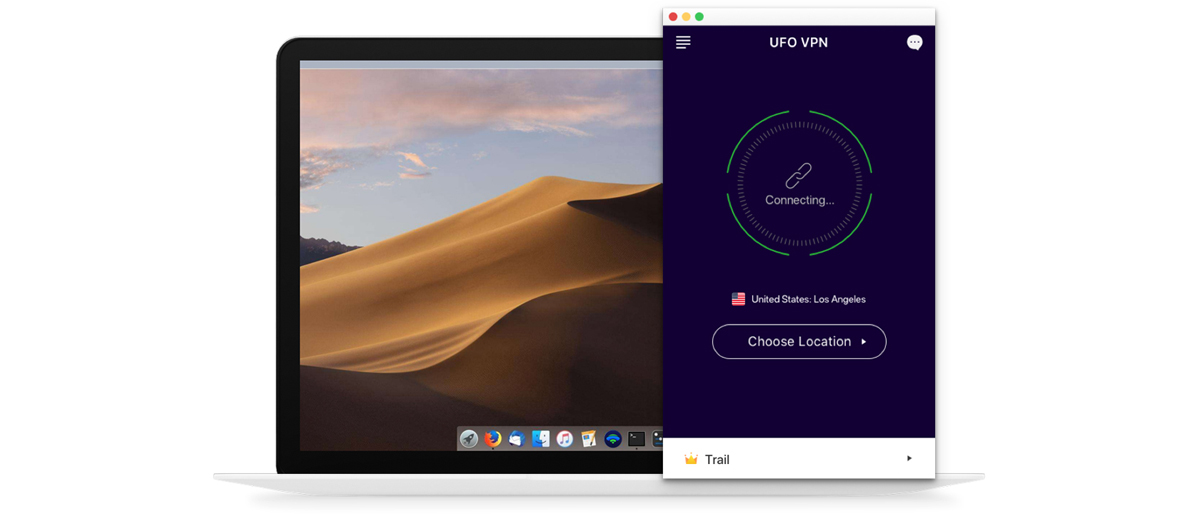Tom's Guide Verdict
While UFO VPN delivered fairly good speeds, it has almost nothing else going for it. With a vastly overexaggerated server count and untrue streaming unblocking claims, it's certainly not a service we'd advise using. However, most troubling is 2020's log and password leak, which in itself is a huge red flag. Our advice? Steer clear, and pick a more reputable service.
Pros
- +
Can access BBC iPlayer
- +
Attractive pricing
- +
Fairly quick connection speeds
- +
Kill switch is effective
Cons
- -
Password and user log leak in 2020
- -
Can't unblock Netflix, Prime Video, Disney+
- -
Support was entirely unresponsive
- -
Claims 50 countries, but only 21 available in-app
Why you can trust Tom's Guide
UFO VPN states to have 20 million users worldwide, and seems to have a pretty hefty foot in the door of the VPN industry. And, with claims of over 2,000 servers in 50 countries, there appears to be a good selection of locations to choose from – almost always a good thing.
UFO VPN also claims to have powerful unblocking abilities, with the website boasting about the apps being able to access Netflix, Disney+ and BBC iPlayer. Here, we certainly put that to test.
Backing that up is a kill switch to protect you should you VPN connection drop out, which nowadays is an essential feature in all the best VPN apps.
But, is it any good, and can you trust any or all of these claims? All you need to do is read on for our full UFO VPN review to find out.
Log and password leak
Before we go any further, we feel obliged to discuss UFO VPN's 2020 user log and password leak. Reported by Comparitech, the leak included user device IP addresses, usage timestamps, device details, geotags, and various session logs.
What's more, passwords stored in plain text were also discovered, putting account security at risk.
While UFO VPN claimed that none of this data could be used to identify individual users, it's still a fairly high level of logging that's not made clear in the provider's privacy policy. If this had happened to a verified zero-logging VPN like ProtonVPN, for example, you'd expect there to be no logs to leak in the first place.
Interestingly, UFO VPN's Android VPN app isn't available on the Google Play store, and you need to download an .APK file to install it – from a second website, no less. This may be to do with the data breach, but we can't be entirely sure.
Whatever the reasoning behind any of this, however, it certainly doesn't instil confidence in UFO VPN, and the lack of activity on the provider's social media and blog make it quite clear it's not taken a proactive approach to resolving the issue.
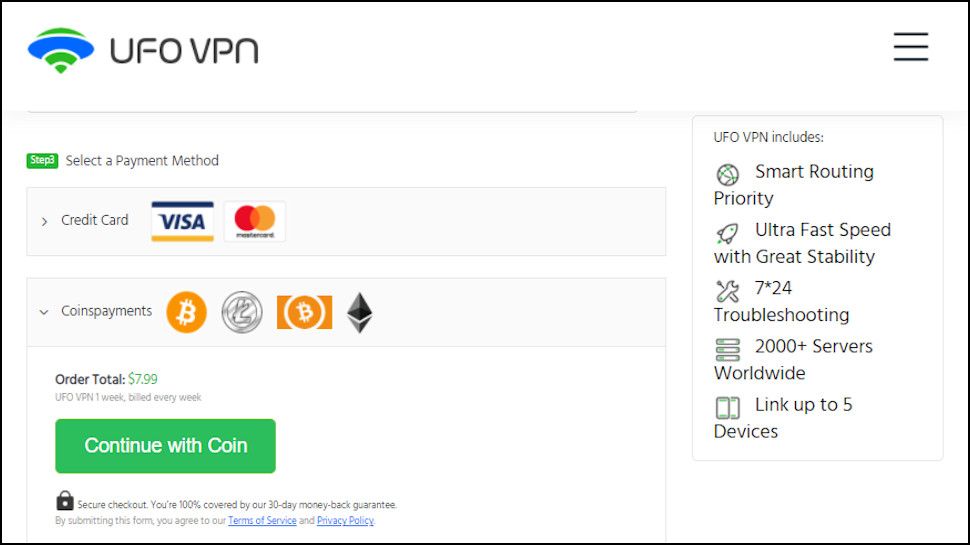
How much does UFO VPN cost?
If you only want to sign up for a month with UFO VPN, it'll set you back $11.99, which is in the mid- to top-range. You can also get a one-week plan, but at $7.99 it's really very expensive.
Things look a little more appealing when you sign up for longer. The one-year plan costs a fair $4.17 a month, but the best price is the two-year plan which is just $2.91 a month. That makes it a cheap VPN compared to much of the competition, but rivals like Surfshark and VyprVPN are cheaper, dipping below $2.50 a month.
From our testing, PayPal doesn't seem to be an option to pay, even though it seems like it on-site. Credit cards are accepted, and Bitcoin is also welcomed, although only through Coinspayments.
Most of UFO VPN's marketing messaging implies an industry-standard 30-day money-back guarantee, but when we dug into the fine print, it appeared only a 7-day guarantee is offered. We certainly wouldn't rely on having 30 days to trial the provider.
UFO VPN also offers a limited free VPN, but we had some issues getting this to work on our device. We'd steer clear of this.
How private is UFO VPN, and does it keep logs?
In all honesty, this section is going to be heavily influenced by the data breach outlined above. Plain-text passwords, undisclosed logging, and no real follow-up to the event all mean that, really, UFO VPN simply isn't private or secure, and shouldn't be trusted with your information.
However, it's still worth digging into the detail to see if there's anything to work on should the provider wish to up its game.
It's not good news here either, though. When we checked the Protocol page, we were expecting to see some detail on what protocols the VPN supports – OpenVPN, surely, and perhaps IKEv2 or WireGuard.
What we actually saw was a list that comprised 'Protocol 1', 'Protocol 2', 'Protocol 3' and 'Protocol 4'. Apparently certain protocols are optimized for certain activities like connection speed and video calling, but with no actual detail on what protocols these are, there's nothing to be learned here.
Overall, UFO VPN does nothing to inspire any confidence in its privacy credentials – it certainly won't be making its way onto our most private VPN list any time soon...
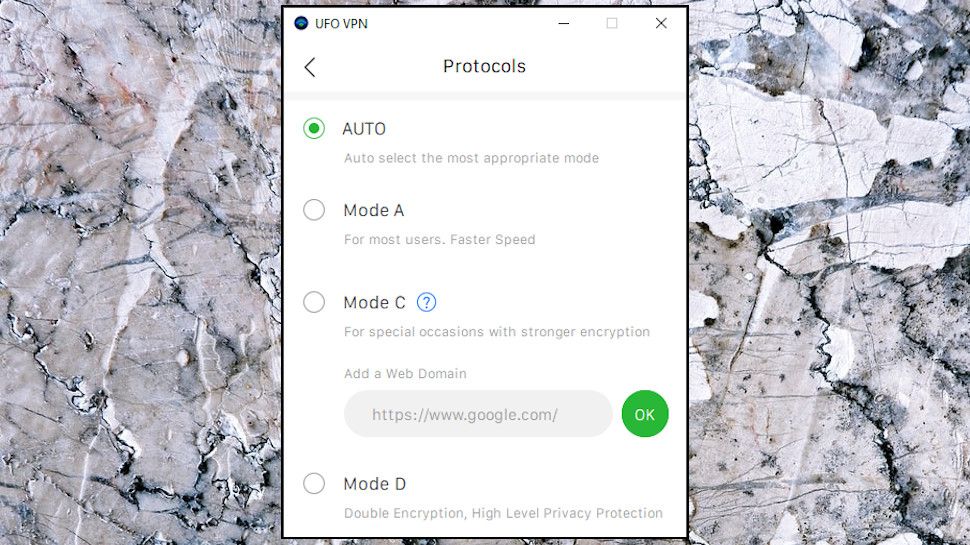
How fast is UFO VPN?
Many users' biggest concern is if their VPN is going to slow down their connection. So, we test providers in the UK and US, using various speed testing tools a number of times. We repeat the process in the morning and the evening, to even out any time-based issues.
In the US, UFO VPN proved to be a reasonably fast VPN, and delivered decent speeds of up to 290Mbps when using its mysterious Mode A Protocol. In the UK, it peaked at an impressive 420Mbps. If we assume we were using some form of OpenVPN, these are very good speeds, and faster than just about any other provider.
However, considering that most providers have implemented WireGuard by now, and that top providers like NordVPN and CyberGhost top out at well over 800Mbps, it's still not exactly class-leading.
Unfortunately, though, the fact that we have no knowledge of what Mode A Protocol actually is makes it impossible to scientifically say if these speeds are good or not. If it is using WireGuard, these speeds would be distinctly uninspiring.
And, with the issues that we've identified with UFO VPN's privacy in mind, it's entirely possible that it's cutting corners in terms of encryption to boost performance. Thanks to the lack of transparency on the provider's end, we simply can't be sure.
How good is UFO VPN for streaming?
Many users also want a streaming VPN in order to enhance any subscriptions they already pay for, so it's an aspect we test thoroughly. UFO VPN claims to be able to unblock any website, so is there any truth in that?
When we tested it with BBC iPlayer, we were pleasantly surprised, and we could stream anything from the British site when connected.
However, it was all downhill from there. When we tried to access US Netflix, we were unable to watch any exclusive content – even when we used the dedicated Netflix server in LA.
Disney+ was also a failure, and when we used the Japanese Disney+ server, we were faced with an error message each time we tried to get streaming.
Finally, we tried Amazon Prime Video, and again, we were unable to unblock it, with Amazon detecting the fact we were using a VPN.
So, if you're looking for a Netflix VPN, or a VPN for any other kind of streaming, for that matter, UFO VPN can't cut the mustard. You're better off going for something like ExpressVPN or ProtonVPN, which can unblock just about every service out there.
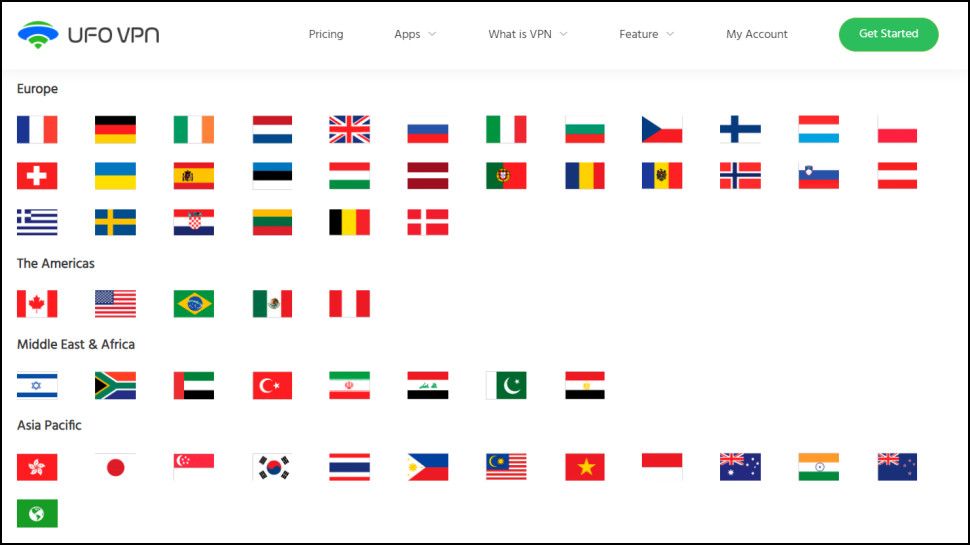
How good are UFO VPN's apps?
Fire up UFO VPN's Windows app and you're faced with a very simple interface. You get a Connect button, a list of locations, a choice between Protocols A, C, and D, a button for the kill switch, and the option to launch the app on start-up.
When we looked at the location list, we noticed a bit of a discrepancy. Although UFO VPN claims to offer servers in a healthy 50 countries worldwide, in-app there only 21 available. Combine that with no Favorites or Recents tab, and it's looking like a distinctly weak application.
Connections took about 10 seconds to establish, which isn't too bad. When we were connected, we took a look at what the app was actually doing.
UFO VPN uses parts of some old open-source software ironically named 'BadVPN'. That's not necessarily bad in itself, but the fact it hasn't been updated since 2019 and is explicitly tagged as 'not being maintained by the author' certainly is.
Many privacy-conscious VPNs invest in their own bare-metal DNS servers that they don't share with anyone else to minimize anything being compromised by a third party. However, while UFO VPN does send your traffic through a tunnel so it's invisible to your local network, it utilizes Google DNS, Few reputable VPNs would consider doing this, and private DNS servers are just about a prerequisite these days.
One surprise was the fact that UFO VPN's kill switch was very effective. Although we couldn't undertake the sort of low-level trickery we usually employ to fool kill switches thanks to UFO's weird protocols, what tests we did run proved it was functional. However, if your connection does cut out, you'll have to manually reconnect.
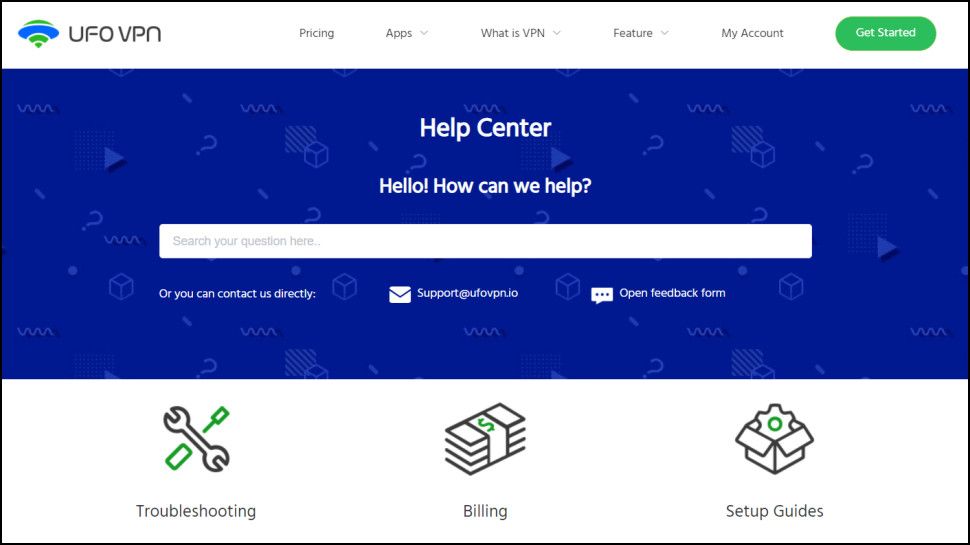
What customer support does UFO VPN offer?
If you have an issue with any VPN, your first port of call will be the written guides on the website – and seeing as even the very best services can sometimes be temperamental, it's important to have support at hand.
Head to UFO VPN's FAQ, though, and you won't be hugely enlightened. There are a few questions and answers, but little of any substance. Answers to some common questions that should be covered are often just one sentence long.
The search function was also just about unusable, and although plenty of VPN support sites seem to have issues with this feature, we simply didn't get any results for simple, common terms like 'speed' or 'protocol'. Perhaps because there aren't any articles to begin with.
You can also send messages to the provider should you not find your answer in the FAQ's slim pickings, and these should be answered within 24 hours. However, when we asked about the discrepancy in server number, we simply didn't get a reply – and we waited two weeks before writing it off.
Finally, you can email support, but it's exactly the same story – no response, weeks later. Arguably the worst support we've had from a VPN provider.
UFO VPN: Final verdict
UFO VPN has one thing going for it – connection speeds. But they're hardly blazing-fast compared to the best of the bunch. And, considering the lack of support, basic apps, plain-text password files, data breaches and downright untrue marketing messages regarding streaming support and the number of server locations, there are just about zero reasons why we could recommend this above any of the dozens of other VPNs we've reviewed.
If you're looking to go cheap, test out Surfshark or CyberGhost. If you want comprehensive support and great streaming performance, have a go with ExpressVPN or ProtonVPN. For super speeds, look at NordVPN or IPVanish. In short, close that UFO VPN tab and go elsewhere – you'll thank yourself in the long-term.

Mo is VPN editor at Tom's Guide. Day-to-day he oversees guides on the best VPNs, privacy, and cybersecurity content, which includes making sure all his recommendations are up to date, accurate, and as useful for the reader as possible. He's a daily VPN user himself – typically NordVPN, but he enjoys a variety – and as a digital privacy advocate he believes that every step should be taken to protect yourself online.
